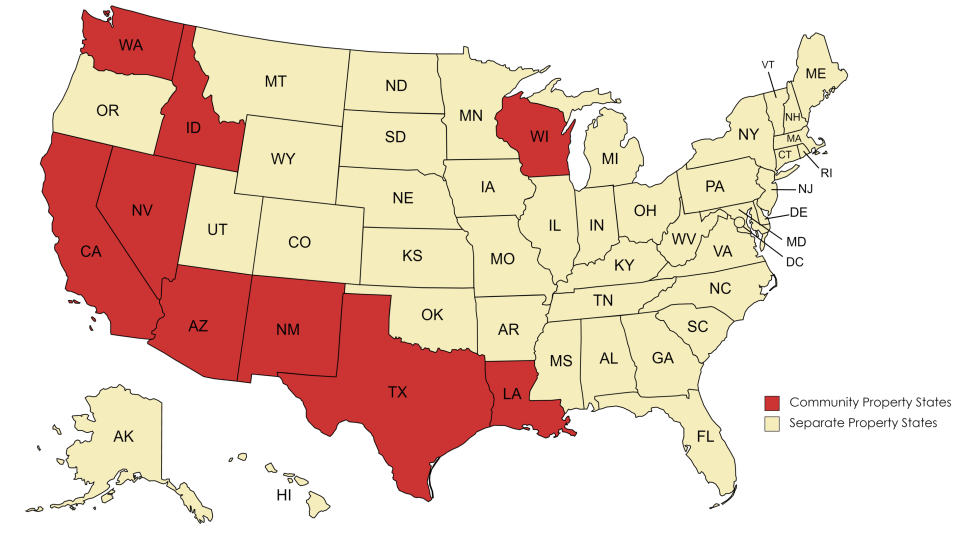This Attorney Revealed Why We Need To Change The Way We Think About Prenups, And It’s Incredibly Eye-Opening
Prenups often get a bad rap. If you want one, you either have considerable assets or one foot out the door. However, Sahar Khorramnezhad, Esq. (@sistalkswithsahar), who is barred in both California and New York, wants people — especially women — to look at prenups as protective guarantees rather than harbingers of divorce. So, she took to TikTok to make her case.

"I'm reading this divorce case, and I had to come on here and tell at least any of my followers: you need to change the way that you think about prenups. They are not instruments that just take things away. They are instruments that guarantee a lot of your rights. The scenario, in this case, is not atypical, so I’m just going to play it out for you," Sahar begins her video.

She goes on to describe a man and woman getting married without discussing finances or expectations in the event of a divorce ("Because who thinks about divorce when they're getting married?" Sahar comments). After having kids, the woman lessens her hours or quits her job to spend more time with them or manage the household with the intent of being "a good wife and mother." In the meantime, the man's career grows unimpeded by marriage or fatherhood.

Then, the couple decides to divorce, and the woman seeks alimony or property settlement. "You go in front of these judges, and they are not as progressive as you think they are," Sahar says. "They're going to say, 'Well, I know he contributed financially to the relationship. What did you contribute?' And you're going to think about all the sacrifices you made to make him who he is, to make the kids who they are. You're going to think about all the times you were a nurturer and you were a caretaker."

"But you know what? You don't have any instrument that says you're going to get compensated for that, so you just did all of that with no guarantee of anything," she concludes. "If you had a prenup, you could have anticipated the sacrifices [you'd] make and made sure you had a guaranteed income at the end of it. And in no way am I saying all prenups are fair, but to the extent that you can anticipate your contributions, you should really write it down."

Needless to say, Sahar's video resonated with hundreds of thousands of people across the internet. Not only was her video viewed 2.2 million times, but it was liked 405,000 times and saved nearly 60,000 times. She also received more than 2,200 comments, the top-voted of which wonder, "What do you do if you're already married without a prenup?" followed by questions about what to include in a prenup.

To find out more (including the answers to these questions), BuzzFeed spoke with Sahar, who originally practiced corporate law after graduating from UCLA. After realizing that area of law lacked a human element, she returned to school to pursue a master's leading to PhD in law. Now, she primarily focuses on the intersection of family law and critical race theory.

"Something from my background that you should know and the reason why I'm so drawn to family law," she immediately prefaced during our conversation, "is that when I was 20, I took a year off between undergrad and law school to try out journalism." During that time, Sahar moved to Iran, where she was born, and met a man who proposed to her after five days. "Like any stupid 20-year-old, I decided to accept," she said. However, after getting married and returning to the US, she realized the marriage wasn't right for her. "But I don't have a right to a divorce in Iran," she revealed. "Now, six years later, I'm still not divorced, and it's been a whole ordeal."
Although Iran and the US have different laws, Sahar understands firsthand just how much women can be disenfranchised by laws. "In the US, a lot of the laws that exist, even within family law, are geared towards men," she said. "It's just the nature of living in a patriarchal society." And the influences of patriarchal social structure extend beyond tangible laws to societal pressures that women face, especially around social value.
At this point, it'd be remiss not to acknowledge the perception that courts favor mothers in cases of divorce or child custody. However, a 2018 report done by the US Census states that though 79.9% of custodial parents are mothers, in 51% of the cases, the parents agree that the mother should have custody — in that the father is not denied custody. In fact, fathers can be favored even if accused or found guilty of abuse.
In 2017, Joan S. Meier, a professor of clinical law and director of the National Family Violence Law Center at the George Washington University Law School, conducted a pilot study of family courts' treatment of custody cases involving abuse and alienation claims. After analyzing 238 cases, the study indicates courts actually favor fathers over mothers in child custody cases involving abuse and parental alienation claims against either parent.
"The concept is, 'Well, you could just walk away.' But this idea undermines all of the societal pressures on women," Sahar asserted. In her next semester, she'll be examining the legal concept of duress in the context of prenups. "They tell us, 'You can just walk away,' but society also tells us, 'Your value is only complete when you're married.' So they'll say, 'You can walk away, but after 35, who wants to be with you?' There's so much emphasis placed on a woman's age that you can't just walk away because that same society is going to turn around and tell you you're rotting goods. Women live in a society where our value as humans depreciates the older we get."

"Think about all the times someone hands someone a prenup two weeks before a wedding and is like, 'Sign it or don't.' That doesn't count as duress under the legal definition," she added.
Today, most people think of prenups as something only necessary for wealthy individuals with assets. However, Sahar wants to reframe prenups as a mechanism for guaranteeing women's protection and rights in a society wherein time governs your value. Rather than feel intimidated by the misconception that prenups connote divorce, she encourages women to try to think about it less personally — especially given the estimate that 50% of marriages end in divorce.

"So many women think, 'That's not my reality.' But so many of us are natural caretakers," Sahar said. "So many of us end up in situations where life just requires one person in the relationship to sacrifice. That's the nature of life. People sometimes don't want to admit it, but one person does end up having to sacrifice for the sake of the family. And that has typically been the woman. But what are you getting in return for the sacrifice?"
For example, it's common to see one spouse sacrificing and helping to put the other through graduate school or assuming their debt. "Then there's a divorce," Sahar illustrates, "but this other person now has a whole career and is in a whole new tax bracket. And the person who gave up their career — what are they supposed to do with that?"
"You can't think the person you're marrying is the person you'd be divorcing. By the time you get to divorce, a lot of people hate each other and are willing to fight tooth and nail for whatever," she emphasized. "If your husband promised you, 'Quit your job, I'll take care of us,' well, you can't take that promise to the bank or to the judge. The judge is going to be like, 'What proof do you have of this?' There are income statements for a salary from a job. There are no income statements for all the times you woke up and had to tuck the kids into bed, or all the times you were exhausted but made sure there was dinner for him. There's no W2 for that."

That being said, what can you do to protect yourself when drawing up a prenup? The first thing: Find out (as in, Google) what kind of laws your state follows, such as property designation. During a divorce, the court will divide marital property (assets and debts) based on whether you live in a separate property or community property state. In community property states, marital property is equally divided 50/50. In separate property states, marital property is subject to equitable distribution at a judge's discretion (unless both parties settle how to divide their marital assets).
Generally speaking, community (or marital) property refers to anything spouses acquire during their marriage and belongs to both spouses, whereas separate property refers to anything a spouse acquires prior to marriage and belongs only to them.
For instance, typically, if you inherit or purchase a house before you're married, it would be considered separate property. If you inherit or purchase a house while you're married, it would be considered community property. (In certain cases, separate property can become community property).
Only nine US states are community property states, so those living in the other 41 will find themselves in an equitable distribution scenario. This means the next thing to find out is whether you're in an all-property or dual-property state. In dual property states, you have to figure out when an asset was acquired (before or during marriage) to determine how it will be distributed in a divorce.

From there, Sahar advises considering what you're coming into the marriage with (perhaps a business) and anticipating what you may gain during the marriage (an inheritance, retirement fund or pension, etc.). Also consider what you may give up during the marriage, including your career, whether permanently or temporarily.
"A lot of people don't even know that if you're married for at least 10 years, your ex-spouse can retire on your Social Security benefits," she noted.
"You can put something in there that says, 'For every X years I'm out of the workforce, I will be entitled to Y amount of alimony upon divorce,' or 'In the event of divorce, I will be entitled to spousal support until I am able to get a degree in X vocation and secure a good paying job,'" Sahar said. "You're accounting for giving up your career. It's a contract. That's what I'm saying. Now, is the other person going to sign it? I don't know. But some people even have clauses guaranteeing them something for every child they have." (Looking at you, Janet Jackson.)

It's also important to note there are different types of spousal support. Only seven states offer permanent spousal support (for life or until the recipient remarries or cohabitates with another person), while others offer temporary (specific period of time) or rehabilitative (until the recipient can become self-sufficient) spousal support.
Fun fact: Janet Jackson's prenup with Qatari businessman Wissam Al Mana included terms that entitled her to $100 million if they were married for at least five years upon divorce and for that $100 million to be doubled if they had a child together (they did).
Now, what if you're already married? You can look into postnuptial agreements. While less popular than prenups, postnups can similarly protect your assets in the event of divorce. Though you're already married, there could be an advantage to having actual insight into your lives and assets as a married couple. The major legal difference between prenups and postnups, however, is a consideration: a mutual exchange of promises in contract law. In prenups, the marriage itself is the consideration.
"That way, you can tell this is a bargain for exchange," Sahar clarified. "The consideration has to be something of monetary value, like, 'I will give up this retirement fund.' Each party has to give us something of value. It can't be $1. It has to be something that the judge can say, 'Okay, you actually gave up something.'"
If you're concerned your spouse won't sign a postnup, Sahar specified, "For the woman who knows her marriage is going to shit, go look at the statutes of your state and what factors the judge is going to consider. Try to gather as much evidence as you can for the factors that could weigh in your favor. You don't need a lawyer for that. So every time this man is telling you, 'Hey, quit your job. Don't go to work,' get it in text and take a screenshot because it's a lot easier to prove you relied on that and the legal case of reliance with proof."

"People can go online and look at the statutes in their state for how judges because judges are bound by rules, have to rule on spousal support and property distribution in the event of a divorce," Sahar pointed out, and she understands exactly how valuable that access to information is — which is what drives her to create digestible videos breaking down legal concepts that empower women.

"As a woman of color, I know what it's like to not have access to information. And I know I have so much privilege in being educated. Not everyone has the resources, time, or money to attain the type of education that I have," Sahar reflected. "Women are so disenfranchised, especially women of color. They don't have the resources to learn about this from a lawyer. So the only way out is for someone to go out of their way and provide free legal advice. If I can do that, it makes my little immigrant girl heart very happy."

More personally, Sahar appreciates not only the opportunity to help women but the ability to use her voice to make an impact. "I struggle sometimes with talking and part of that is because, when I was 17, I got meningitis. I was given two weeks to live," she opened up.
"I lost all my motor functions, including walking and talking. I had to relearn everything. So sometimes, I struggle with getting what's in my mind across. And the fact that it's working, it just makes me so happy. That's something in my own private life I struggle with so much, and I'm so self-conscious and nervous. When people say my videos make an impact, that means so much to me because I never thought I would be able to talk again, let alone that my words would be so impactful."

